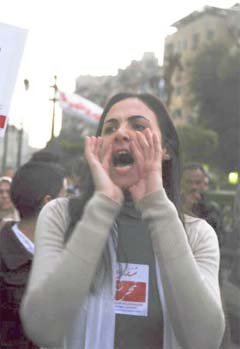fitness news
![]() ,
,![]()
Font size Women’s Health
Struggles for Womens Rights in Libya
– Reported, June 14, 2013
 As transitioning countries across the Middle East struggle with the big-picture question of the relationship between Islam and politics, Karamas work is more important than ever. The rise of Islamist governments raises concerns about the integration of human rights generally, and womens rights in particular, in the reconstituted legal systems of Egypt, Tunisia, and Libya. Conservative religious voices are calling for rollbacks in womens rights on religious grounds, while others seek to reconcile a modern role for women with sharia.
As transitioning countries across the Middle East struggle with the big-picture question of the relationship between Islam and politics, Karamas work is more important than ever. The rise of Islamist governments raises concerns about the integration of human rights generally, and womens rights in particular, in the reconstituted legal systems of Egypt, Tunisia, and Libya. Conservative religious voices are calling for rollbacks in womens rights on religious grounds, while others seek to reconcile a modern role for women with sharia.
Zahra Langhi, a co-founder of the Libyan Womens Platform for Peacean advocacy grouphas played an important role in ensuring womens political representation in Libyas new parliament. She led the organizations successful lobbying effort to implement a zippered list, a system that alternates the names of male and female candidates on political parties electoral lists, which resulted in women gaining 17 percent of the countrys National Assembly seats. Langhi first learned about the potential of zippered lists to boost womens representation through her work with Karamaan example of civil society and information-sharing at its best. Langhi is now focused on ensuring that womens voices are heard during the process of drafting the Libyan constitution.
In Egypt, Fatemah Kafaghy is well aware of the risks women face in losing ground on basic rights and expressed concern about the lack of clearer protections for womens rights in the countrys new constitution. The battle over womens rightsand human rights more broadlyis fiercely contested not only between secularists and Islamists, but among Islamists themselves. Kafaghy noted the role of the prominent and influential Al-Azhar University in the ongoing debates on womens role in society. Egyptians often look to Al-Azhar, the institute of Islamic learning in Egypt, for guidance; its scholars are currently working on a document to reaffirm womens rights in the context of Islamic law. Though the document was supposed to be published in November, it is still in the drafting stages; a group of female leaders recently met with the Grand Imam of Al-Azhar to provide their input and revise the document. It is currently under review by both Al-Azhars Islamic Research Committee and High Committee of Scholars.
Kafaghy said that while she agrees with 75 percent of what shes seen of the Al-Azhar document, she was concerned by language that casts women as complementary to men (this issue of complementarity was the cause for uproar in Tunisia in August). The most recent summary of the Al-Azhar Document on Womens Rights (Arabic) currently comprises seven main points, which address equal political and economic rights, the right to inherit and manage money independently, the ability to divorce (phrased as the ability to exit a marriage contract), among other things. It acknowledges the reality that many women must work but does not state that womens employment is an unequivocal right. Specifically, it says that working is an honorable way to make a living and comports with Islam, but that employment must be conducive to the situation of the spouses, the family, and Islamic customsa point that will undoubtedly lend itself to problems of interpretation. Similarly, the document notes the historic precedent of women participating in public life, although in qualified language. However, the draft document explicitly addresses sexual violence and violence against women, stating that under Islam, it is the responsibility of the individual and the society to protect the inviolability of a persons body.
For better or for worse, the reality is that womens rights will be argued on religious grounds in the transitioning democracies of the Middle East, given the political influence of Islamist parties. This is the argument of my book Paradise Beneath Her Feet, which was recently released in an updated paperback version. The efforts of women like Langhi and Kafaghy to harness the support of moderate religious leaders will undoubtedly be important to the sustainability of their efforts to expand opportunities for women.
CREDITS.
For more Libya news Click Here